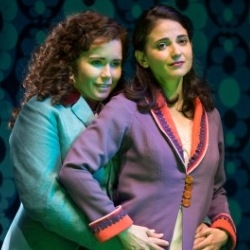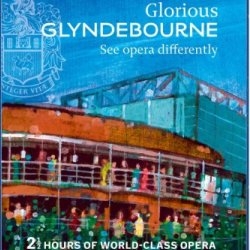
© Bill Cooper
Strauss’s great romantic opera is the canvas upon which this company profile is painted, with revealing visits to the costume workshop, preparations by front-of-house and garden staff, and music director Robin Ticciati’s piano rehearsal. Jones’s forensic influence is a constant presence throughout: the director’s research activities may have extended to viewing 100-year-old pornography, but that says more about his attention to detail than it does about prurience (although a brief glimpse of the Marschallin's nude suit will have pricked a few onlookers' fantasies).
When mezzo Tara Erraught chuckles about the fun she’s had playing a ‘dirty little boy’ it makes a nonsense of the recent flames (many of them artificially fanned, it must be said) that have challenged her suitability for the role. She and Jones see Octavian as a priapic teenager let loose in a dream-date’s bedroom, and that’s precisely how it comes across not just in the production but also, for those who have ears to hear, in Hugo von Hofmannsthal’s libretto.
Glyndebourne itself looks a dream in HD, and anyone who treats themselves to a visit on a warm summer’s day will find that it’s exactly the same in real life. The fact that people dress up for the occasion doesn’t mean it’s full of stuffed shirts; if something of that welcoming warmth came across on the screen the programme will have done its job. (MV)
Glorious Glyndebourne encapsulates everything that makes the company special
For newcomers who want to see more of the company’s work there’s a new DVD of 80th birthday celebrations from Opus Arte called Glorious Glyndebourne. It’s a selection of bleeding chunks, or more aptly (given the location) picnic-bite-size morsels of some of the company’s most notable stagings.

As is often the case when pulling extracts from operas that differ wildly in style there’s invariably a lack of coherence; but all the extracts in the first half could conceivably be said to come under the umbrella of love and fidelity. Thus we have the opening of Michael Grandage’s flower-power Figaro followed by the rumbustious courting rites and animal-wedding of Vixen Sharp Ears and the Fox from Melly Still’s Cunning Little Vixen. We also Rinuccio’s and Lauretta’s arias from Gianni Schicchi, a pleading Sally Matthews begging her father’s permission to marry. Three extracts from Così fan tutte keep the theme going, although things take a darker hue when we arrive at Billy Budd (– gay marriage wasn’t on the cards in those days!)
There’s less of a theme running through part two although it’s good to be reminded of such runaway Glyndebourne successes as David McVicar’s Giulio Cesare, Nikolaus Lehnhoff’s Tristan und Isolde and Glyndebourne’s second excursion into Wagner territory, McVicar’s Meistersinger. The sound and picture quality on the Blu-Ray are outstanding, as is all the singing, as you’d expect at this particular address. It leaves the viewer wanting more – which without wishing to sound too cynical, is probably Opus Arte’s intention as all the full length versions are available to buy. Still, Glorious Glyndebourne nicely encapsulates everything that makes Glyndebourne special and is a fitting tribute in this celebratory year. (KMcD)












